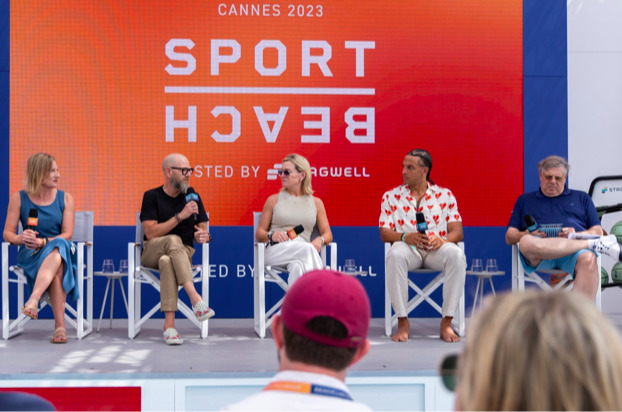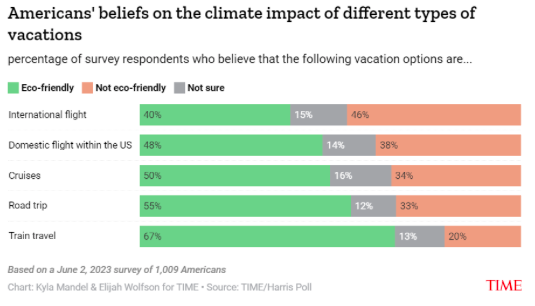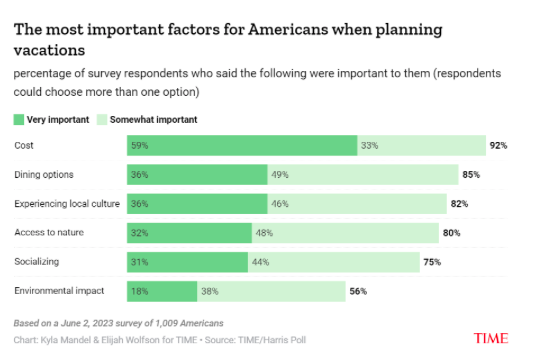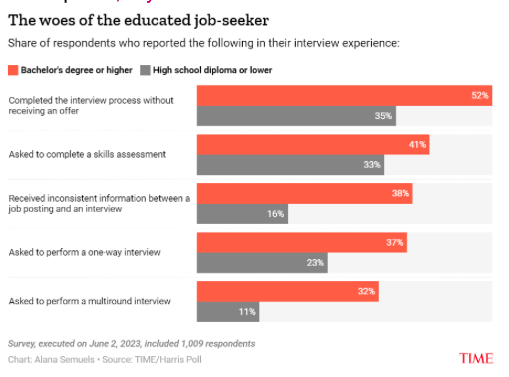Brief • 4 min Read
The latest trends in culture and society from The Harris Poll.
Good afternoon from Cannes, France, where we’re in full swing at The Cannes Lions International Festival of Creativity. Yesterday, our CEO John Gerzema joined a great panel on Sports Diplomacy at Stagwell’s Sport Beach with (left to right) RingCentral SVP Corp Mkt Leesa Eichberger, Harris Poll John Gerzema, MassMutual CMO Jennifer Halloran, NFL WR and SpecialOlympics Ambassador Mack Hollins, and Stagwell CEO Mark Penn. They talked about brands and politics (and more on that in our first story below). We’ll bring a full recap next week, but it’s all work right now, despite the scenery.

One of the major themes at Cannes is equity and inclusion. We’re finally seeing greater diversity reflected in the festival’s creativity, marketing, and agencies. And in our America This Week survey, fielded June 16th to 18th among 2,103 Americans, nearly 3 in 5 (59%) Americans back home are concerned about racial inequity, while half (49%) are worried about gender inequity. However, these numbers jump among younger (Gen Z: 68%, 62%; Millennials: 66%, 58%) and BIPOC Americans (69%, 57%).
And the economy is always on the public’s mind. According to the June Harvard CAPS-Harris Poll (fielded June 14th to 15th among 2,090 registered voters), only (38%) of U.S. voters believe that the economy today is strong (v. weak: 62%). Half (49%) report their financial situation is worsening (v. improving: 26%, staying the same: 25%).
Here’s what else we’ve got this week: First, a look into what brands need to avoid this political season to retain their consumer bases. Also, the latest consumer behavior is scrimping now to splurge later. And we dive into the environmental impact of cruises that Americans need to be made aware of. And finally, the rumor of the death of the 9-5 work week is premature.
You can download the new ATW monthly summary tabs and May deck here.
Political Season Is In Full Swing. Brands Beware: Barron’s-Harris Poll
The following 17 months leading up to the presidential election are full of potential flashpoints for extensive business details our Harris Poll Chairman (and Stagwell Chairman/CEO) Mark Penn in his latest commentary for Barron’s. He describes what businesses that want to avoid becoming the next victim need to do.
- In today’s polarized environment, once businesses activate their consumers’ political brains, they find themselves in the political whipsaw. They immediately risk alienating half their market – or more since both sides can simultaneously be mad at a brand for different reasons.
- Americans are so divided over politics that they practically see two different realities: More than half (55%) of Democrats think the economy is on the right track; only (14%) of Republicans say it’s good, according to the May Harvard CAPS/Harris Poll.
- Democrats see the most critical issues as gun control, women’s rights, and climate change; Republicans think they are inflation, crime, and immigration.
- So, what do companies need to keep in mind? Companies need to be authentic to their politics, writes Penn. If political issues were core to brand development, then you don’t have to worry that they will be sidelined by activist groups (i.e., Ben and Jerry’s, Patagonia).
- Advertisers also need to spend more time ensuring they aren’t placing inappropriate ads or influencer sponsorships out of sync with their consumers, employees, and investors – especially as brands could be vulnerable if their marketing teams try to broaden their brands too quickly.
- Next to their sustainability reports, every big brand needs a risk and reputation audit to identify its vulnerability to political Armageddon. This means extensive research on all their stakeholders about their politics, lifestyles, consumer preferences, and how they respond to hot-button issues.
Takeaway: “But someone will be tagged “it,” writes Penn. When controversy does arise, companies need a ready defense to ensure they stand by their actions…Big brands today need an issues audit and a plan to spring into action with a full team across both sides of the aisle, financial communications, and research already done. Otherwise, billions of dollars in market share and market cap can go up in smoke almost overnight. Political response in today’s market could be the most valuable response to keep people using their consumer’s brain and keep their brand beloved by all” (Barron’s).
Scrimp or Splurge?: Barron’s-Harris Poll
Persistently high prices are forcing many Americans to get creative with their budgets. However, most Americans may be cutting back on everyday purchases to afford the occasional splurge, as found by the latest report by Harris Poll’s Thought Leadership and Futures Practice and covered by Barron’s.
- The year of cost-saving: More than 8 in 10 (81%) Americans have implemented cost-saving measures this year, such as trading down, shopping at less expensive retailers, or substituting cheaper alternatives for name-brand products, and (69%) have cut out more “in-between” spending this year.
- Nearly 3 in 5 (58%) Americans (and 67% of Millennials) would rather cut back on everyday basics to afford the occasional splurge.
- And over half (54%) have splurged already on something in 2023, such as high-quality home items and accessories, a luxury fashion item, and luxury beauty/skincare products, with more younger Americans having splurged (Gen Z: 75%, Millennials: 68%).
- Splurging into trouble: 3 in 10 (30%) Americans say they have splurged on premium experiences or luxury items they couldn’t afford, especially younger consumers (Millennials: 50%, Gen Z: 40%).
- At The Harris Poll, we’ve labeled the scrimp/splurge phenomenon a “split-brain” budget. Still, others have called it “the lipstick effect,” as research has shown that lipstick sales tend to pop during recessions, even when consumer spending is otherwise depressed.
Takeaway: “It is both surprising and fascinating to witness Americans adopting a conscious approach to balancing their expenses, making deliberate choices to cut back on essentials while treating themselves to the luxuries that bring them joy,” says Abbey Lunney, Managing Director of Thought Leadership and Trends at The Harris Poll.
Cruising Into The Latest Climate Disaster: TIME-Harris Poll
To future archeologists, mega cruise ships might be some of the strangest artifacts of our civilization – these goliaths of mass-engineered delight, armed with dangling water slides and phalanxes of umbrellas. Behind the awe, however, maybe shock that the whole thing isn’t exactly sustainable, according to our latest survey with TIME.

- The dirty environmental secrets are hiding in the depths of the ships: Half (50%) of Americans surveyed consider taking a cruise to be “eco-friendly,” with only one in three (34%) regarding such vacations as being bad for the environment.
- And more Americans wrongfully regard flying as being the worst for the environment, despite cruising’s bigger carbon footprint per passenger.:
- Costs matter the most when vacation planning: While three in five (59%) consider the price to be a significant factor when vacation planning, less than a fifth (18%) say the same about the environmental impacts of their future vacation.

Takeaway: Daniel Skjeldam, CEO of Hurtigruten, also has more faith that cruise-goers actually care about the environment than either activists or other cruise executives. And as the effects of climate change become more pronounced, he says, more of the world’s cruise-buying masses will begin to see the light. “The public demands are coming.”
A Normal 9-5 Isn’t Too Outdated: Express Employment Professionals-Harris Poll
Flexible work schedules have become popular and are here to stay post-pandemic. Still, claims that the traditional 9 to 5 work week will vanish are premature, according to our latest research with Express Employment Professionals. But according to a recent study with TIME, a lot needs to be improved in this current job market.
- For current jobseekers, slightly more would prefer to work an 8-hour workday with a flexible schedule time (40%) compared to a traditional 9 to 5 (34%) or a 10-hour/4 day week compressed schedule (18%).
- Jobseekers argue that increased control increases productivity: If given the ability to design their work schedule, most feel they would be more productive (56%) or have the same productivity level (39%).
- However, job hunting has become miserable, regardless of education level: Half (52%) of job seekers with bachelor’s degrees who had at least one interview completed the interview process without receiving an offer, compared to (35%) with at most a high school diploma, says our latest research with TIME.

- Speaking of a difficult job market, our latest America This Week report found that only a quarter (27%) of employed Americans strongly agree that they could seek a higher-paying job.
Takeaway: “I do believe the 40-hour work week will become less and less of a focus for white-collar positions,” said Alyssa Chumbley, an Express franchise owner in Indiana. “People are driven by what they do and how well they do it, not for how long they do it,” she said. “It’s best to feed into that driving factor through positive reinforcement (fewer hours worked per week; perhaps even occasionally) instead of negative (work 40 hours or more, no matter what).”
Subscribe for more Insights
Subscribe to our newsletter for the latest trends in business, politics, culture, and more.
Download the Data
This survey was conducted online within the U.S. by The Harris Poll from June 16th to 18th among a nationally representative sample of 2,103 U.S. adults.
Download
Subscribe for more Insights
Subscribe to our newsletter for the latest trends in business, politics, culture, and more.
Download the Data
This survey was conducted online within the U.S. by The Harris Poll from June 16th to 18th among a nationally representative sample of 2,103 U.S. adults.
DownloadRelated Content








